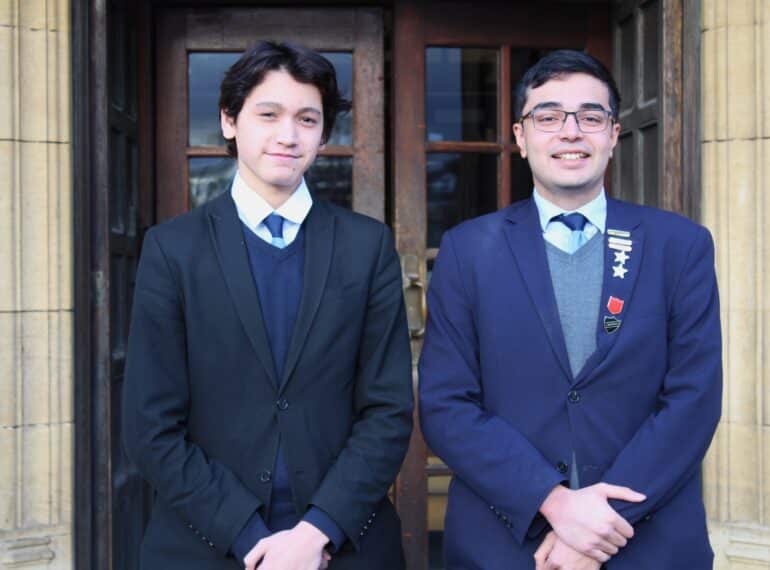
As delegates from around the world discuss critical environmental matters at COP29 in Azerbaijan, two QE sixth-formers have come seventh out of 37,000 entries in the Climate Science Olympiad.
 With the international olympiad open to people aged up to 25, Andreas Angelopolous and Saim Khan fought off competition from undergraduate & postgraduate students and potentially from young climate professional scientists to claim their place.
With the international olympiad open to people aged up to 25, Andreas Angelopolous and Saim Khan fought off competition from undergraduate & postgraduate students and potentially from young climate professional scientists to claim their place.
Scoring in the final was extremely tight, with the 87.0 points awarded for Andreas and Saim’s 3,000-word essay on the Kyrgyz Republic’s food system only 1.4 points behind the fourth-placed entry. (The scores of the top three entries are being revealed in Baku at COP29, the UN’s climate summit).
Deputy Head (Academic) Anne Macdonald said: “For two school-age students to have secured such success against significantly older entrants sets this apart as a truly outstanding achievement. It’s really an unbelievable feat, made believable only because we know how brilliant they both are!”
Both Saim and Andreas were part of the QE team that recorded a top ten finish in the international finals of the World Economics Cup, having previously come first in Europe in the Continental Round.
The qualifier round and quarter-finals for the Climate Science Olympiad comprised a 25-minute online quiz involving multiple-choice questions. The semi-finals involved writing a 1,000-word essay on three key themes, namely energy, development and natural systems.
In the finals, entrants were set the task of writing a longer essay on a complex global problem.
Once it was submitted, they had two online interviews: each involved giving a 15 min presentation and then answering questions from a panel of scientists, innovators and policymakers for five–ten minutes.
The second interview was for the top 20 entrants online. During this, entrants had to demonstrate they had responded to some of the feedback from the first panel.
In their essay, the pair wrote that they were presenting “a comprehensive approach towards creating a resilient and equitable food system in the Kyrgyz Republic”. Their systems-oriented solution included promoting capital investment; encouraging research and promoting collaboration among farmers; and a focus on water supply. The collaboration included farmers from the neighbouring country of Uzbekistan working with the Kyrgyz counterparts. The Uzbek government even provided feedback on Saim and Andreas’s proposal praising its “incredible detail for the monitoring and regulatory frameworks, which is of course vital for socio-economic change”. The Uzbek government also stated: “Promoting public, private and international financing are all crucial, and it is especially important to tie them into a single coherent system which gives confidence to all through regulation, which this entry clearly recognises.”
Andreas and Saim were awarded gold certificates and prize money of $1,000.

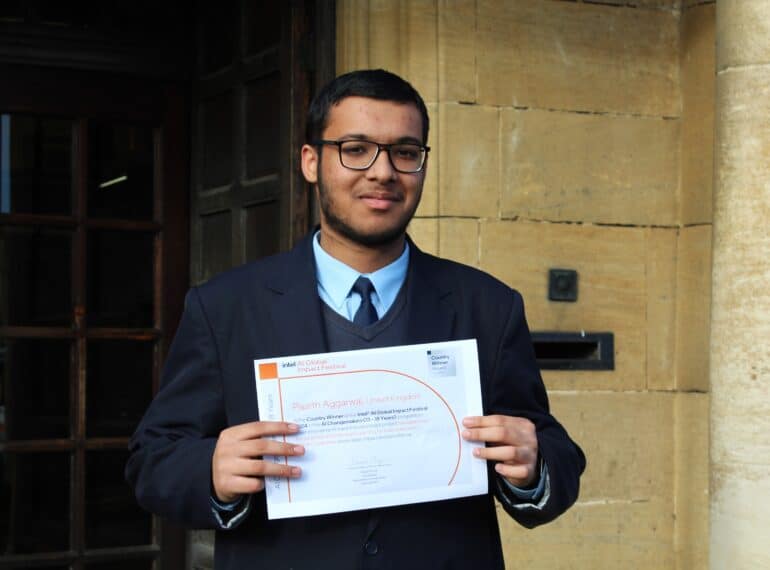
 Parth took the national title in the AI Changemakers ages 13–18 category after impressing judges in the Intel AI Global Impact Festival 2024 with his multilingual GenAI-powered NavigateNinja app.
Parth took the national title in the AI Changemakers ages 13–18 category after impressing judges in the Intel AI Global Impact Festival 2024 with his multilingual GenAI-powered NavigateNinja app. He spent many hours researching, developing, and refining the project. His app provides unique content across different subjects, based on skill level; it aims to enhance comprehension and information retention.
He spent many hours researching, developing, and refining the project. His app provides unique content across different subjects, based on skill level; it aims to enhance comprehension and information retention.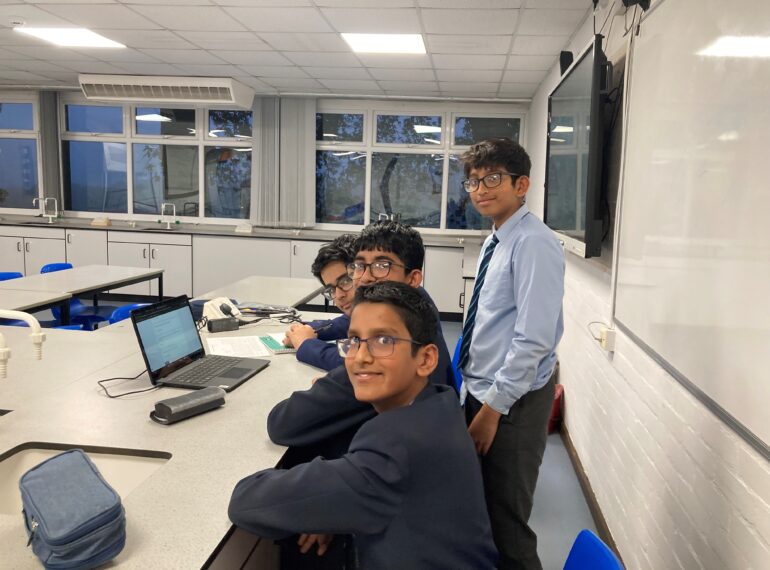
 One team, pictured top, took first place – and thus qualified for the national finals in the spring – with a score of 40 out of 43. Another QE team was only one point behind, beating Harrow and Watford Grammar School for Boys into joint third place.
One team, pictured top, took first place – and thus qualified for the national finals in the spring – with a score of 40 out of 43. Another QE team was only one point behind, beating Harrow and Watford Grammar School for Boys into joint third place.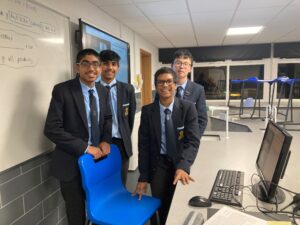 Congratulating all the QE entrants, Myles Worsley, an RSC Chilterns and Middlesex Section committee member, commented on the “excellent” scores of the winners and runners-up. “They showed an impressive knowledge and understanding of Chemistry,” he said.
Congratulating all the QE entrants, Myles Worsley, an RSC Chilterns and Middlesex Section committee member, commented on the “excellent” scores of the winners and runners-up. “They showed an impressive knowledge and understanding of Chemistry,” he said.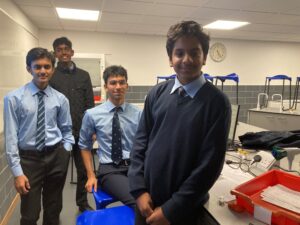 Other rounds included:
Other rounds included: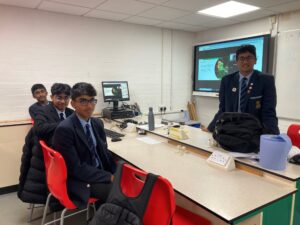 “This caused me much amusement, as some of the boys were discussing what the difference was between baths salts and smelling salts!” Dr Irvine said.
“This caused me much amusement, as some of the boys were discussing what the difference was between baths salts and smelling salts!” Dr Irvine said.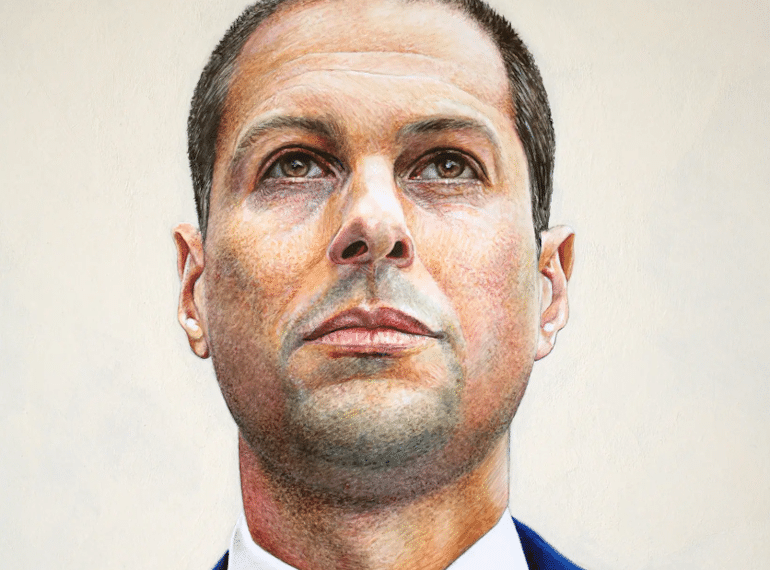

 An A-level German student, Chanakya was nominated by the School for one of the prestigious scholarships offered by the Dresden Trust, a British charity that fosters relations with the eastern German city of Dresden. One of the greatest centres of European culture, Dresden, which is in Saxony, was destroyed by Allied bombing in February 1945.
An A-level German student, Chanakya was nominated by the School for one of the prestigious scholarships offered by the Dresden Trust, a British charity that fosters relations with the eastern German city of Dresden. One of the greatest centres of European culture, Dresden, which is in Saxony, was destroyed by Allied bombing in February 1945. “Each school year begins with a church service in the Kreuzkirche (Church of the Holy Cross) at which new students receive a model fish representing the school logo (the ichthys) to symbolise their acceptance into the school community. This year, the Year 6s were kind enough to make extra ‘Benno fish’ to be presented to the school’s exchange students. I certainly felt incredibly welcome being presented my fish at the end of a service that had otherwise been full of lovely German choral music,” he wrote.
“Each school year begins with a church service in the Kreuzkirche (Church of the Holy Cross) at which new students receive a model fish representing the school logo (the ichthys) to symbolise their acceptance into the school community. This year, the Year 6s were kind enough to make extra ‘Benno fish’ to be presented to the school’s exchange students. I certainly felt incredibly welcome being presented my fish at the end of a service that had otherwise been full of lovely German choral music,” he wrote. During his free hours, he enjoyed exploring the city, especially its “gorgeous baroque church – the ‘Frauenkirche’ (‘Church of Our Lady’)”. This was rebuilt following its destruction in World War II, with the support of benefactors including the Dresden Trust
During his free hours, he enjoyed exploring the city, especially its “gorgeous baroque church – the ‘Frauenkirche’ (‘Church of Our Lady’)”. This was rebuilt following its destruction in World War II, with the support of benefactors including the Dresden Trust